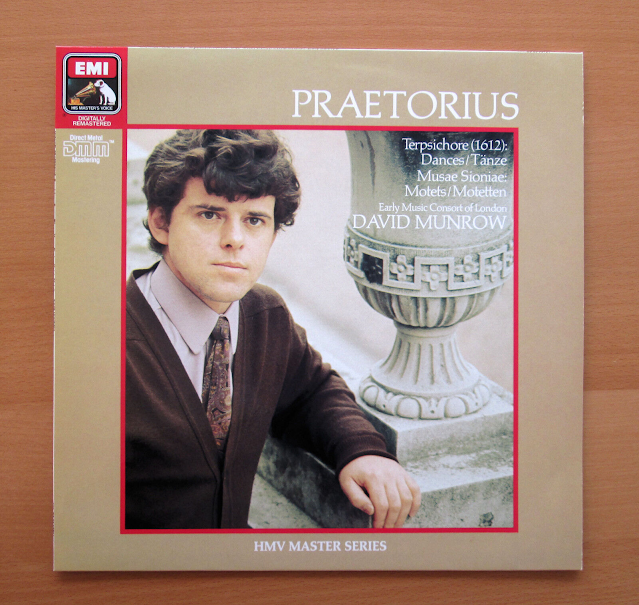Authenticity, and Early Music
From a paper on Authenticity, and Early Music, (page 3) by Nicholas Kenyon plus link http://www.questia.com/PM.qst?a=o&docId=9546594
In 1968 the work of David Munrow's Early Music Consort of
London was taking on an international dimension with its first
tours and recordings, and over the next few years it succeeded in
galvanizing audiences with its highly professionalized skills and
invigorating performance style. Munrow had burst upon an
unsuspecting world in May 1965, when he first assembled a
Renaissance dance band to play Susato Danserye at Birming-
ham University, and from then on his professional career,
powered by driving enthusiasm and hard work, made remark-
able strides. It is chronicled in the recordings he made for
EMI--first of Morley and Susato, and then Ecco la primavera in
1969, Music of the Crusades in 1971, The Triumphs of Maximilian I
in 1973, The Art of Courtly Love, and, as vocal music became
more important to him, two major projects which appeared
only after his death in 1976, Music of the Gothic Era and The Art
of the Netherlands.
One has only to compare Munrow's performances of Machaut,
for example, with more recent recordings by Gothic Voices, or
his whole approach to the early medieval repertory with that of
a group such as Sequentia, to see how quickly the field has
developed and how precarious were some of its scholarly tenets.
But--to state an obvious but important fact--it was not as
purveyors of 'authentic performance' that the Consort won
such a following among audiences. It was because they made
music with a conviction and an enthusiasm that won people
over; because their concerts were skilfully programmed, well
prepared, professionally organized, and animated by Munrow's
unique personal skills. Almost at a stroke, early music was
removed from the realms of a specialist activity for which
special pleading had to be made, and put in a forum where it
could compete on equal terms with any kind of music-making.
It would be fair to characterize it as an approach in which
scholarly certainty came second to the performer's instinct--
.....................
-3-
Questia, a part of Gale, Cengage Learning. www.questia.com
Publication Information: Book Title: Authenticity and Early Music: A Symposium. Contributors: Nicholas Kenyon - editor. Publisher: Oxford University Press. Place of Publication: Oxford. Publication Year: 1988. Page Number: 3.
In 1968 the work of David Munrow's Early Music Consort of
London was taking on an international dimension with its first
tours and recordings, and over the next few years it succeeded in
galvanizing audiences with its highly professionalized skills and
invigorating performance style. Munrow had burst upon an
unsuspecting world in May 1965, when he first assembled a
Renaissance dance band to play Susato Danserye at Birming-
ham University, and from then on his professional career,
powered by driving enthusiasm and hard work, made remark-
able strides. It is chronicled in the recordings he made for
EMI--first of Morley and Susato, and then Ecco la primavera in
1969, Music of the Crusades in 1971, The Triumphs of Maximilian I
in 1973, The Art of Courtly Love, and, as vocal music became
more important to him, two major projects which appeared
only after his death in 1976, Music of the Gothic Era and The Art
of the Netherlands.
One has only to compare Munrow's performances of Machaut,
for example, with more recent recordings by Gothic Voices, or
his whole approach to the early medieval repertory with that of
a group such as Sequentia, to see how quickly the field has
developed and how precarious were some of its scholarly tenets.
But--to state an obvious but important fact--it was not as
purveyors of 'authentic performance' that the Consort won
such a following among audiences. It was because they made
music with a conviction and an enthusiasm that won people
over; because their concerts were skilfully programmed, well
prepared, professionally organized, and animated by Munrow's
unique personal skills. Almost at a stroke, early music was
removed from the realms of a specialist activity for which
special pleading had to be made, and put in a forum where it
could compete on equal terms with any kind of music-making.
It would be fair to characterize it as an approach in which
scholarly certainty came second to the performer's instinct--
.....................
-3-
Questia, a part of Gale, Cengage Learning. www.questia.com
Publication Information: Book Title: Authenticity and Early Music: A Symposium. Contributors: Nicholas Kenyon - editor. Publisher: Oxford University Press. Place of Publication: Oxford. Publication Year: 1988. Page Number: 3.

Comments
Post a Comment